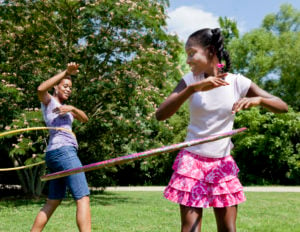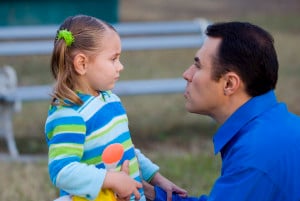
A child and an adult hula hoop in a park.
Last year, I turned forty and had my third child.
Both seemed like important events, and so I decided that along with these milestones, I wanted to add one more: doing a local half marathon with my uncle and cousin.
I’ve run on and off for years, but never towards a goal, and never so many miles. So it was definitely something that I needed to prepare for. As a result, I spent a lot of time trying to squeeze in a run, or fit in a swim, at my local Y – something that my older kids, nine and six, were, of course, witness to and began to comment on.
But did I really want my daughter to note I was grumpier if I didn’t get a run in, like she did one particularly drizzly day when we were all trapped inside? And was it healthy for them to celebrate my fitness goals alongside me?
I wasn’t sure, so, I began to think about how, in a world of toxic messages about weight and health and fitness, I wanted to talk to my kids about exercise.
On the one hand, I was proud of my accomplishments. Oh the other hand, as a feminist, I worried about the relationship between exercise and eating disorders, the impact on body image, and the effect of fitness advertising.
Plus, I didn’t want to fall into the trap of sending my kids seemingly positive messages, like, “strong is the new skinny,” which may sound good on the surface, but which plenty of people have pointed out, just substitute one unrealistic body ideal for another.
So, with those things in mind, here are four things I started with.
1. Exercise Shouldn’t Be Framed in Terms of Weight Loss
So often, exercise is framed in terms of weight loss. It’s common for parents to talk about needing to hit the gym to work off last night’s dessert or to champion the benefits of school gym programs to deal with America’s so-called childhood obesity crisis. But this is problematic for a whole host of reasons.
The first is that it positions losing weight as a desirable goal. The second is that unless you’re an elite athlete on a super restrictive diet, it rarely actually accomplishes this goal, and just sets people up to fail. And the third is that there are tons of reasons to exercise that simply aren’t about losing weight.
For me, these include getting to listen to all the podcasts and music I want without having to suffer through someone else’s picks, getting real alone time, sleeping better, getting a mental health boost, and helping me keep up with three kids under the age of ten.
Really, it is important for our children to understand that exercise is about more than weight loss, both as a way for them to avoid unrealistic expectations if they do take up a physical activity, and also as a way for them to help navigate standard script they get from media and mainstream society about this issue.
What You Can Say Instead:
There are a lot of great reasons to get some physical activity in.
For example, exercise has been found to strengthen cardiac health, improve mobility in people with all sorts of physical diseases, decrease pain related to musculoskeletal diseases, and alleviate the symptoms of depression and chronic fatigue syndrome.
Of course, these issues won’t be the most salient for most kids. I mean, what twelve-year-old is concerned with their joint health?
But hearing from your parents reasons for exercising that aren’t only about fitting into those pre-pregnancy jeans or shrinking that beer belly can help to counteract a lot of the problematic messages about fitness that our kids are getting from other sources.
2. Exercise Shouldn’t Be Framed in Terms of Other Body Changes Either
A lot of people dislike specific parts of their bodies, and a parent may think nothing of muttering disparagingly about their jiggly arms or thunder thighs in front of their kids.
But when we compartmentalize our own bodies like this, we send a message to our kids that it’s also okay for them to hate certain parts of themselves as well – and that with just enough willpower or hard work, they can create a specific looking body.
Not only is that simply impossible, since the idea of spot training is BS, but it’s a really harmful message and one that marketers have long tried to capitalize on.
The fact is, for most people, the shape and size their bodies – not to mention the shape and size of a body that they don’t even inhabit, like their children’s – is simply not within their control.
Trying to change this can be a quick way to make you and your kids miserable.
What You Can Say Instead:
If you’re concerned about the messages your kids are getting about exercise, consider ditching the word altogether.
You can talk about specific things that might be fun or interesting to try – like going for a bike ride or a swim, playing mini golf, taking a walk, skateboarding, or flying a kite – simply in terms of their being fun activities. There’s no need to bring “exercise” and “health” and “fitness” into it at all.
Doing this can be a good way for us to help our kids develop a love for an activity independent of how they think it might affect their bodies. That’s a really important way to help them become more confident and to take pride in things that have nothing to do with their appearance.
3. Recognize the Many Ways Your Kids Can Have Fun, Rather Than Focusing on Sports
Some parents are very sporty, yet have kids who simply aren’t. And while you might want to share your love of tennis, or biking, or mountaineering with your children, setting up an expectation that they’ll be athletes can send the message that you’re disappointed in them – or that their interests simply aren’t good enough.
Take my father as an example. He was one of five, but the only one not into sports or the great outdoors. He dreaded gym class, and would have far preferred to stay home with a good book than to be dragged on yet another family hike or canoe trip.
But you know what? In the long run, none of that mattered. He’s almost seventy now and still isn’t athletic. But he’s had a long and successful career as a historian, has a ton of interests, travels all over the world, is close with his large family, and enjoys a busy social life with friends.
While it can be nice to do things with your kids, if they’re resistant, ask yourself if you’re pushing them to join the Little League team because you think they’ll have a blast, or if it’s because you always envisioned yourself as coach.
Kids can have so many cool talents and interests (I just dropped one of mine off at a day camp where they spend the afternoon creating art out of found objects, for example), and as parents, we can nurture those interests as well!
What You Can Say Instead:
Feel free to tell your kids how you loved to ski a child, and if you think they might enjoy doing so themselves, by all means, let them give it a whirl.
But if they don’t show an interest, there are probably a million things you might enjoy doing together instead.
My daughter is a big fan of video games and crafting, neither of which I have a lot of interest in. But this year, she gave me a gift certificate for a mother/daughter book club. The first book we read together was Wonder. We are now on to I Am Malala. It was all her idea: She hit on something we could both enjoy, and it’s been a really nice way for us to connect. (Plus, I’m getting to read books I probably wouldn’t have otherwise!)
Look, just because you want the things you do with your kids to have an active component, there is no guarantee that that is the place that will be the best fit. And if you find something else to bond over, you might discover it is just as rewarding.
4. Don’t Value Your Kids’ Athleticism Over Their Other Qualities
Many parents see their children’s bodies as a reflection of their own parenting.
In some situations, it’s almost as if some think that having a fat non-sporty kid makes them seem like a bad parent, while having a thin athletic kid makes them seem like a good one.
As a result, we see a lot of well-intentioned parents doing some real harm to their kids’ body image and mental health.
That’s not surprising, given the fact that this message is common in mainstream America: Parents of child athletes are often celebrated for their dedication, while the rest of us are fed a steady diet of parent-shaming over their kids’ BMIs and where parents are blamed for the so-called “obesity crisis” for allowing their kids too much screen time.
It’s also important to remember that in plenty of communities, exercise means something far different than kicking around a soccer ball or playing a team sport. And in plenty of cultures, it’s simply considered unacceptable for girls in particular to participate in physical activity. Plus, in some cases, the clothing required for a range of sports (say, swimming) may simply not be possible for some kids to wear.
And for children with a range of disabilities, pushing an exercise expectation is just plain cruel.
So tempering your judgment of your own parenting based on your kid’s’ fitness level and withholding judgment about how others parent their kids in this realm is a pretty wise thing to do.
What You Can Say Instead:
Some kids are academic superstars. Some are creative geniuses. Some just aren’t going to have any obvious standout qualities. That’s okay, too.
There are many ways to value our kids – and looking beyond the football hero model to figure out where they shine isn’t all too hard.
***
I’m a Michelle Obama fan. And as First Lady causes go, I’ll take her “Let’s Move!” over, say, Nancy Reagan’s “Just Say No to Drugs” any day of the week. But the let’s move climate has its downsides as well: It links fitness to weight and weight to health, and as a result, it can foster an environment where we negatively judge people who aren’t—well—moving.
And when we do that, we are once again blaming individuals for their poor health, rather than the larger systems that prevent people from being healthy.
As a parent who has become increasingly sporty with age (try telling 25-year-old chain smoking me that I’d take up running – ha!), I know what a positive impact physical activity has had on my life.
But I also know that a lot of what we hear about diet, exercise, and health isn’t based in fact – and that the way the message on exercise is often presented to kids can a lot do more harm than good.
[do_widget id=’text-101′]
Ellen Friedrichs is a Contributing Writer for Everyday Feminism. She’s a health educator, sometimes writer, and mom. She has worked at Manhattan’s Museum of Sex, developed sex education curricula in Mumbai, India, and run HIV prevention programs for at-risk teens in the South Bronx. Currently, Ellen runs a middle and high school health education program and teaches human sexuality at Brooklyn College. More of Ellen’s writing can be found here. Follow her on Twitter @ellenkatef.
Search our 3000+ articles!
Read our articles about:
Our online racial justice training
Used by hundreds of universities, non-profits, and businesses.
Click to learn more




















